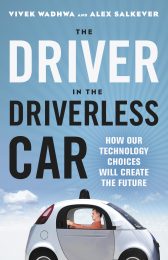Technology is creating the most exciting innovations the world has ever seen. It is also causing anxiety about our future. Navigating technological change at light speed is much harder if you don’t have a trusted Sherpa to be your guide. Vivek Wadhwa has become a globally respected voice on advancing technologies and innovation (Named Silicon Valley Forum’s 2018 VISIONARY AWARD-WINNER. Past honorees include Bill Gates, Elon Musk, Linda Rottenberg, Scott McNealy, Ray Kurzweil, Reed Hastings, Tim O’Reilly, Padmasree Warrior, Anne Wojcicki, Reid Hoffman).
Vivek’s background is impressive — an Entrepreneur, Academic, Author, Keynote Speaker wrapped into a wonderfully vibrant and charismatic package. His research is focused on the critical advances in robotics, artificial intelligence, computing, synthetic biology, 3D printing, medicine, and nanomaterials, and how these advances are creating disruptive changes for companies, industries, governments and the culture at large.
Vivek just rejoined Harvard as a Distinguished Fellow, Harvard Law School, Labor and Worklife Program, where he will help lead a critical three year research project on theeffects of technology on future employment and work. This will be the first study on how technology will effect the core foundations of our economy.
He is also currently a Distinguished Fellow at Carnegie Mellon University’s College of Engineering, he teaches on CMU’s Silicon Valley campus about the latest exponential technologies; technology convergence and industry disruption; risks and regulation; and the new rules of innovation. Vivek was also a Director of Research at Duke University’s Pratt School of Engineering, Vice President of Innovation and Research at Singularity University, and Fellow at Stanford University’s Rock Center for Corporate Governance, Harvard Law School, and Emory University. Remarkably, he has held as many as six simultaneous appointments at top universities.
Vivek’s syndicated column for The Washington Post is one of the world’s most popular columns on all things technology and innovation. In June he will release his highly anticipated new book, Your Happiness Was Hacked: Why Tech Is Winning the Battle to Control Your Brain–and How to Fight Back. Previous books include the award-winning,The Driver in the Driverless Car: How Our Technology Choices Will Create the Future, he also wrote The Immigrant Exodus: Why America Is Losing the Global Race to Capture Entrepreneurial Talent, which was named by The Economist as a Book of the Year of 2012, and Innovating Women: The Changing Face of Technology, for which the Financial Times named him #2 on its global list of the top ten men worth emulating.
This talent for communicating the complexities of global technological advancements in simple, almost poetic ways have made Vivek one of the most in demand keynote speakers in the world. He gives more than 100 talks every year to the most prestigious and powerful audiences, including world leaders, CEOs, industry organizations, universities, entrepreneurship groups, and a multitude of national science and engineering academies.
He started his career as a software developer and gained a deep understanding of the challenges in building computer systems. His experience as Vice President of Information Services at investment banking powerhouse CS First Boston (CSFB), spearheading the development of technology for creating computer-aided software-writing systems, was so successful that CSFB decided to spin off that business unit into its own company, Seer Technologies. As its Executive Vice President and Chief Technology Officer, Wadhwa helped grow the nascent startup into a $118 million publicly traded company.
The explosive growth of the Internet afforded Vivek with an even greater opportunity to help businesses adapt to new and fast-changing technologies, and founded Relativity Technologies. As a result of his vision, Forbes.com named Wadhwa a Leader of Tomorrow, and Fortune declared Relativity one of the 25 coolest companies in the world.
Questions? Contact Us Any Time:
805.965.1400
info@bigspeak.com
In 2012, the U.S. Government awarded Wadhwa distinguished recognition as an “Outstanding American by Choice”, for his “commitment to this country and to the common civic values that unite us as Americans”. He was also named one of the world’s “Top 100 Global Thinkers” by Foreign Policy magazine in that year; in June 2013, he was onTIME’s list of “Tech 40”, one of forty of the most influential minds in tech; and in September 2015, he was second on a list of “ten men worth emulating” in the Financial Times.



